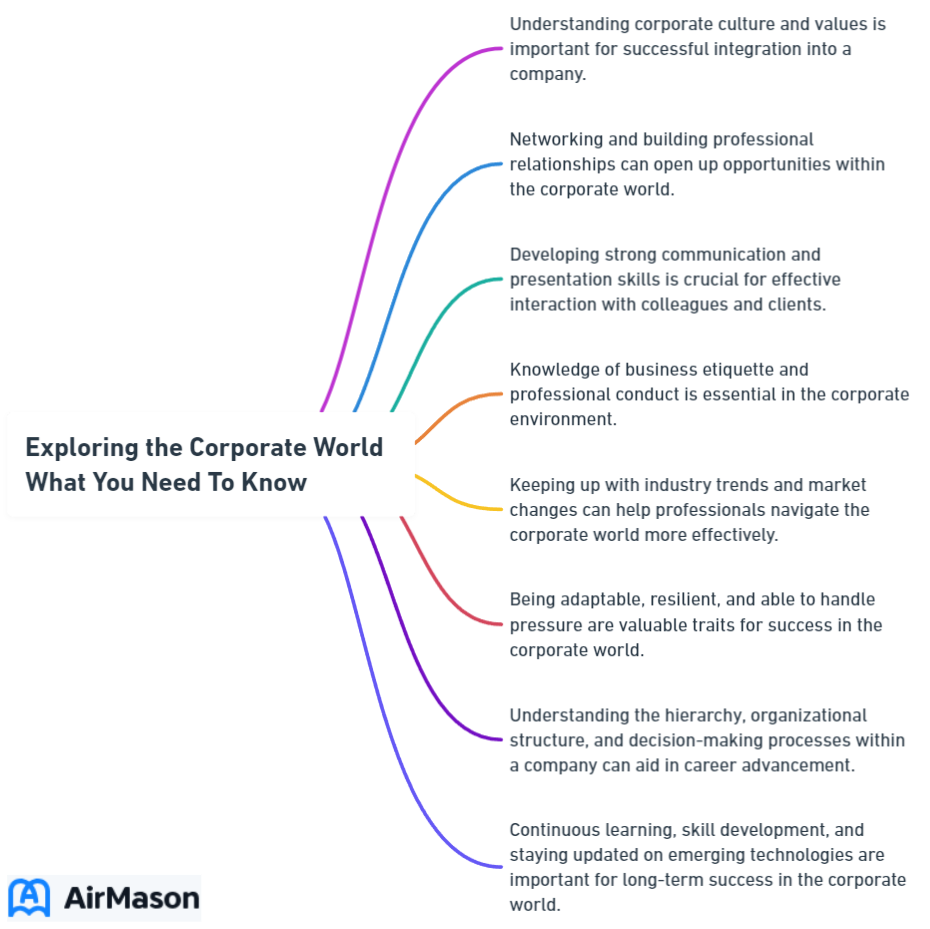
Welcome to the dynamic world of corporate jobs in 2024! With a multitude of roles spanning across multiple industries, understanding the corporate environment is essential for those looking to excel in their careers. In this blog post, we’ll provide you with insights into the structure, competition, and performance-driven nature of the corporate world, as well as the key skills needed for success and strategies for navigating corporate culture and politics. Let’s dive in!
Key Takeaways
- Gain an understanding of the corporate hierarchy and competitive environment to succeed in the corporate world.
- Technical, soft skills and adaptability are key for success in a variety of roles.
- Take advantage of career advancement opportunities such as promotions, lateral moves or professional development programs.
Understanding the Corporate World
To succeed in the corporate world, one must grasp a wide range of elements that characterize this milieu. The corporate hierarchy, the rivalry between businesses, and the unyielding emphasis on performance are all integral to understanding today’s dynamic and fiercely competitive landscape.
Exploring these factors will equip you with crucial insights, enabling you to flourish in the corporate arena and boost your career trajectory.
The Hierarchy in Corporations
In the corporate world, the hierarchy is a multi tier management structure that dictates the flow of information and decision-making process within an organization. From entry-level employees to senior management and corporate executives, each level of the hierarchy comes with its own set of responsibilities and challenges. Managers, for instance, often face significant stress and frustration as they must meet the expectations of higher-level executives while addressing the concerns of their subordinates.
Grasping the corporate hierarchy is fundamental for career progression, guiding employees in plotting their career journey and ascending the corporate ladder. Nevertheless, bear in mind that this layered structure can occasionally foster a sense of detachment between employees and the organization’s upper echelons, complicating career advancement.

Competitive Environment
The corporate world’s intense competition is a significant hurdle, necessitating employees to distinguish themselves from their colleagues. Given the fierce competition in the corporate environment, setting yourself apart in the corporate setting can enhance your work’s visibility and recognition, thereby favorably influencing your career advancement.
To set yourself apart and shine in your role, you’ll need to take the initiative, be proactive, and consistently exceed expectations in your work.
Performance Focus
Performance assessments are pivotal in shaping an employee’s progression and advancement in the corporate sphere. Corporate cultures may vary, with some prioritizing work-life balance and employee welfare, while others emphasize profitability and efficiency. In performance-driven environments, employees may face pressure to meet their targets and struggle to maintain a healthy work-life balance.
Being a top performer in the corporate world means consistently exceeding expectations and delivering superior work. Nevertheless, failing to achieve a top score in a performance evaluation can hinder an employee’s career development and prospects. Therefore, appreciating the importance of performance evaluations and endeavoring to excel in your role are vital for career progression.
An Organization’s Culture
An organization’s culture encompasses the shared values, beliefs, and behaviors that define its unique identity. It is the collective expression of how employees interact, collaborate, and adapt to challenges within the workplace. This culture shapes the way individuals perceive their roles, influences decision-making, and ultimately drives the organization’s success. An organization’s culture is not static; it evolves over time, influenced by leadership styles, external factors, and the collective experiences of its members. A healthy and inclusive culture fosters a sense of belonging among employees, leading to higher levels of engagement, productivity, and retention. Conversely, a toxic or misaligned culture can stifle innovation, hinder collaboration, and impede progress towards organizational goals. Therefore, understanding and actively shaping an organization’s culture is a pivotal aspect of effective leadership and long-term success.
Types of Corporate Jobs

The corporate realm spans an extensive variety of job positions across diverse industries, each presenting unique requisites and challenges. From finance and marketing to human resources and sales jobs, most corporate jobs offer diverse career paths and opportunities for growth.
Subsequent sections offer a detailed exploration of some prevalent corporate job positions, including management positions, granting insights into the responsibilities and skills requisite for triumph in each domain.
Finance Jobs
Finance jobs, such as financial analysts, accountants, and financial managers, play a pivotal role in managing a company’s financial operations. These professionals are responsible for tasks like budgeting, forecasting, accounting, and financial reporting, as well as managing investments and ensuring compliance with financial regulations.
To excel in a finance role, an individual must possess a diverse skill set, including accounting, interpersonal and communication skills, problem-solving abilities, technical expertise, leadership, and financial modeling. The daily tasks of an accountant, for example, may involve documenting financial transactions, preparing financial statements, analyzing operational costs, budgeting, tax preparation, auditing financial statements, resolving discrepancies, monitoring the efficiency of accounting processes, and analyzing financial data to support business decision-making.
Marketing Jobs
Marketing professionals, including marketing managers, brand managers, and coordinators, are crucial to a company’s success as they drive the promotion and sales of products or services. They contribute to the company’s growth by developing and executing marketing strategies, managing branding efforts, creating advertising campaigns, and maintaining a strong social media presence.
Each marketing role comes with its unique set of responsibilities. Here are some examples:
- Branding professionals strive to build the company’s reputation and foster trust with customers by creating a unique image and identity.
- Advertising professionals craft and disseminate persuasive advertisements through various mediums.
- Social media professionals construct and maintain the company’s social media presence, engaging with customers and increasing brand recognition.
Human Resources Jobs
Human resources (HR) professionals play a vital role in managing a company’s workforce. Their responsibilities include:
- Recruitment
- Hiring
- Employee benefits
- Training employees and development
- Ensuring compliance with labor laws
- Creating and enforcing company policies
- Maintaining a conducive work environment.
In order to excel in an HR role, individuals must possess a variety of skills, such as:
- Proficiency in HR software
- Knowledge of talent management systems
- Recruitment expertise
- Onboarding skills
- Interviewing capabilities
- Understanding of compensation and benefits
- Familiarity with social media platforms
- Proficiency in HRIS and talent acquisition software
Effective workforce management by HR professionals can significantly enhance the organization’s overall triumph and expansion.
Key Skills for Success in the Corporate World

For flourishing in the corporate sphere, having a well-rounded skill set encompassing technical, soft, and adaptability skills is vital. These skills not only enable you to excel in your current role but also prepare you for future career advancements.
Subsequent sections will delve into the crucial skills requisite for corporate success, aiding in the establishment of a robust career foundation.
Technical Skills
Technical skills are industry-specific abilities that allow individuals to perform tasks and responsibilities proficiently and productively. These skills are indispensable for various roles, such as:
- IT professionals
- Engineers
- Data analysts
- Software developers
Acquiring technical skills not only augments productivity but also contributes to problem-solving, innovation, and decision-making. They empower employees to adjust to technological advancements, remain competitive in the market, and contribute to the expansion and success of the organization.
Technical skills may differ across different corporate sectors, contingent upon the particular industry and job requirements. In some sectors, there may be a greater emphasis on technical skills of a specialized nature, such as programming languages or data analysis, while in others, technical skills of a different nature, such as mechanical or engineering expertise, may be given greater priority. Consequently, it is imperative to identify the technical skills that are most pertinent to your desired industry and job role in order to augment your employability and success in the corporate world.
Soft Skills
Soft skills, such as communication, teamwork, and problem-solving, are highly valued in the corporate world as they assist employees in communicating effectively, working together as a team, and resolving issues. According to a survey, 92% of hiring managers consider soft skills to be of equal importance to technical skills. Cultivating soft skills early in one’s career can make one a more desirable candidate for career advancement.
Effective communication is essential in the corporate environment as it enables employees to cooperate, foster relationships, and comprehend each other’s perspectives. Teamwork, on the other hand, is crucial for enhancing productivity, promoting collaboration, and cultivating a sense of unity. Problem-solving skills are vital for better decision-making, fostering innovation, enabling efficient conflict resolution, and promoting adaptability and resilience.
Adaptability and Continuous Learning
Adaptability and perpetual learning are paramount for achieving success in the corporate arena. Adaptability allows organizations to swiftly and effectively react to changes in their environment, guaranteeing success in the contemporary workplace. Being adaptable also makes one more valuable to their employer and better suited for leadership positions. Additionally, it assists in navigating and prospering in an ever-evolving business landscape.
Continuous learning is a beneficial factor for success in the corporate world, as it increases knowledge and skills, develops problem-solving capabilities, encourages adaptability to change, and encourages innovation and creativity. It enables individuals to remain apprised of the latest industry trends and advancements, allowing them to make informed decisions and remain competitive. Furthermore, continuous learning assists in cultivating a growth mindset and a strong professional network, which are essential for career progression and opportunities for promotion.
Cultivate Culture
To truly thrive, organizations must actively cultivate culture. This involves fostering an environment where values, beliefs, and behaviors align with the company’s mission and vision. Cultivating culture requires deliberate effort from leaders and employees alike. It begins by clearly defining the core principles that guide decision-making and interactions within the organization. These principles serve as the foundation upon which a strong and cohesive culture is built. Additionally, it involves nurturing open communication, trust, and a sense of belonging among team members, allowing for a more collaborative and innovative work environment. By consistently investing in and reinforcing the desired cultural elements, a company can create a positive and productive atmosphere that not only attracts top talent but also retains it, ultimately leading to long-term success.
Navigating Corporate Culture and Politics

In the corporate realm, comprehending how to traverse the intricate landscape of corporate culture and politics is vital for success. Building relationships, networking, and managing conflicts are all crucial aspects of thriving in this environment.
Subsequent sections will equip you with strategies and insights to adeptly steer through the corporate world and enhance your career trajectory.
Building Relationships
Nurturing robust professional relationships is essential for professional development and achievement. Building strong relationships in the corporate world can offer chances for mentorship, networking, and collaboration, which can result in heightened visibility, access to new projects or promotions, and the cultivation of new abilities. Moreover, solid relationships with colleagues and superiors can augment job satisfaction and create a nurturing work atmosphere, which can further contribute to career development.
To cultivate relationships in the corporate environment, it’s important to:
- Recognize the importance of strong professional relationships for career growth and success
- Acknowledge that managers in the corporate world often experience considerable stress and frustration
- Understand that building professional relationships in corporations can have a profound effect on career advancement
Being proactive and genuine in your interactions with colleagues and superiors can go a long way in fostering strong professional relationships.
Networking
Networking is of paramount importance in the corporate world as it facilitates the formation of relationships, enlargement of professional contacts, and the generation of possibilities for career progression. Networking facilitates access to precious information, resources, and potential business alliances. It also augments visibility and reputation within the industry, thereby leading to augmented possibilities for collaboration and progression.
In order to make the most of networking opportunities, it’s crucial to be proactive, attend industry events, and engage with others in your field. Building a strong professional network can provide you with access to job openings, professional connections, learning and development opportunities, increased visibility and recognition, and access to valuable information and resources. In essence, networking is a powerful tool for career advancement and success in the corporate world.
Conflict Management
Conflicts are inevitable in any workplace, and learning to manage them effectively is crucial for maintaining professionalism and ensuring a harmonious work environment. Conflict management is of great importance in the corporate world as it:
- Assists in nurturing a work environment that encourages creative thinking and innovation
- Invites new perspectives and encourages healthy dialogue and discussion
- Promotes a culture of collaboration and teamwork
- Improves communication and problem-solving abilities
- Reduces stress and enhances employee morale
- Builds trust and strengthens relationships among team members.
Effective conflict management techniques in the corporate world include:
- Addressing conflicts promptly
- Ensuring all parties understand the issue
- Facilitating open and honest dialogue between the involved parties
- Articulating a solution that meets the needs of all parties involved
- Continuously monitoring and following up on the resolution to ensure its effectiveness
By employing these techniques, you can maintain professionalism and handle conflicts efficiently, contributing to a positive and productive workplace.
Fostering Positive Culture in the Workplace
Creating and sustaining a positive culture in the workplace is paramount for a thriving and motivated team. A positive culture in the workplace not only enhances employee satisfaction but also bolsters productivity and creativity. It is characterized by an environment where open communication, mutual respect, and a shared sense of purpose are valued. When positive culture in the workplace is prioritized, employees feel empowered, leading to a higher retention rate and attracting top talent. Moreover, it fosters a sense of belonging and camaraderie among team members, promoting a collaborative atmosphere that propels the organization forward. In essence, investing in a positive culture in the workplace is an investment in the long-term success and well-being of both the employees and the company.
Work-Life Balance in the Corporate World

In the brisk corporate realm, sustaining a balanced work-life equilibrium is indispensable for both personal wellness and professional triumph. Striking the right balance between work and personal life can help employees:
- Stay focused
- Stay motivated
- Stay productive in their jobs
- Ensure that their personal needs are met
Subsequent sections will scrutinize strategies to attain a wholesome work-life equilibrium in the corporate sphere.
Setting Boundaries
Establishing boundaries in the corporate world is essential as it facilitates a balance that promotes better work-life integration, decreases stress, and improves overall job satisfaction. Some measures that can help you set boundaries at work include:
- Clearly defining your job responsibilities
- Communicating your availability
- Organizing tasks in order of importance
- Taking breaks
- Setting work hours
- Refraining from tasks beyond your job description
- Confidently communicating your boundaries
By setting boundaries, you can ensure that you maintain a healthy balance between your professional and personal life.
Time Management
Effective time management is crucial for maintaining a healthy work-life balance and ensuring success in the corporate world. It allows you to prioritize tasks, set deadlines, and enhance efficiency, leading to improved performance, timely completion of work, reduced stress and anxiety, enhanced work-life balance, and overall job satisfaction. In addition, effective time management allows employees to accomplish more in a shorter period, adhering to structured schedules and deadlines that result in increased productivity and efficiency in the workplace.
To master time management, consider implementing the following strategies:
- Set attainable goals.
- Break tasks into smaller components.
- Create a to-do list.
- Assign priorities to tasks.
- Delegate tasks to others.
- Take periodic breaks.
- Avoid multitasking.
By implementing these time management strategies, you can ensure that you’re able to juggle both work and personal responsibilities effectively.
Prioritizing Self-Care
Prioritizing self-care is essential for maintaining mental and physical health while working in the corporate world. Some common self-care practices for corporate employees include:
- Packing a nutritious lunch
- Taking breaks outdoors
- Increasing water intake
- Setting goals
- Exercising regularly
- Engaging in mindfulness
- Offering mutual support in the workplace
- Taking free health and fitness classes
- Surrounding oneself with positive people
The advantages of self-care for corporate employees include enhanced productivity, sounder decision-making, augmented job satisfaction, and enhanced overall health. To prioritize self-care in the corporate world, allocate time for yourself, devise a self-care plan, and take breaks throughout the day. By focusing on your well-being, you’ll be better equipped to handle the demands of the corporate world and excel in your career.
Career Advancement Opportunities

For those willing to exert effort and perpetually enhance their skills, the corporate realm presents a plethora of career advancement prospects. From promotions and lateral moves to professional development programs, there are various career path options for individuals to grow and thrive in their careers.
Subsequent sections will delve into common career advancement opportunities in the corporate sphere, guiding you towards success.
Promotions
Promotions are a significant aspect of career advancement in the corporate world, and several factors contribute to an employee’s eligibility for a promotion. Performance metrics such as sales performance, customer satisfaction, leadership and management skills, project management, innovation and problem-solving, and collaboration and teamwork are all taken into account when promoting an individual. Performance perception also plays a crucial role in the promotion process, as it can influence the company’s decision-making process.
To increase your chances of receiving a promotion, it’s essential to:
- Consistently exceed expectations
- Demonstrate your value to the company
- Maintain a positive attitude towards your work
- Build a network of influential leaders, sponsors, and mentors who are familiar with your accomplishments
- Cultivate strong professional relationships
By focusing on your performance and cultivating strong professional relationships, you can increase your chances of advancing in your career.
Lateral Moves
Lateral moves, or transitioning to a job on the same level as your previous position but in a different department or company, can provide new experiences and skills, ultimately benefiting your career growth. While lateral moves may not result in immediate changes in salary, title, or level, they can offer valuable opportunities for personal and professional development.
To make the most of a lateral move, consider how the new role aligns with your long-term career goals and the skills you can gain from the transition. By taking on new challenges and expanding your skill set, you’ll become more marketable and versatile in the corporate world.
Additionally, lateral moves can help you broaden your network, expose you to different aspects of the business, and enhance your overall understanding of the company’s operations.
Professional Development Programs
Professional development programs are designed to help individuals:
- Hone their skills and knowledge in a particular field
- Acquire new competencies
- Stay abreast of the most recent tendencies in their field
- Connect with professionals in the field
- Obtain a competitive edge in the job market
These training programs ultimately contribute to individuals’ career advancement.
To maximize the benefits of professional development programs, follow these steps:
- Be proactive in seeking out opportunities for growth.
- Set clear goals for skill development.
- Solicit feedback and guidance from mentors or trainers.
- Connect with experts in your field.
- Apply the newly learned skills in real-world scenarios.
By engaging in professional development programs, you can further your career, enhance your marketability, and stay competitive in the corporate world.
Summary
In conclusion, navigating the corporate world in 2024 requires a deep understanding of its structure, competition, and performance-driven nature, as well as the development of essential technical, soft, and adaptability skills. By effectively managing your work-life balance, building strong professional relationships, and continuously seeking opportunities for growth through promotions, lateral moves, and professional development programs, you can excel in your corporate career and achieve long-term success. So, gear up and embrace the challenges and opportunities that the corporate world has to offer!
Frequently Asked Questions
What is corporate world?
The corporate world is the realm of business and industry that awaits individuals post-secondary education, providing various career opportunities.
How do you get into the corporate world?
Getting into the corporate world involves dressing professionally, perfecting an elevator pitch, networking with colleagues, and creating a strong resume to show off your skills. Consider partnering with a recruiter who understands the landscape and have a plan for what role you would like to take on.
What is the disadvantage of corporate world?
The lack of engagement and poor corporate culture are key disadvantages of the corporate world. This can be remedied through actively engaging with employees to create a healthier workplace environment.
What does working at corporate mean?
Working at corporate means having an employee position within a large company, organization or corporation composed of several branches in different locations. It generally implies a stable job and is a term that refers to one’s role within the organization.
What factors contribute to promotions in the corporate world?
Performance, customer satisfaction, leadership, project management, problem-solving, and collaboration are all essential factors in achieving a promotion in the corporate world.